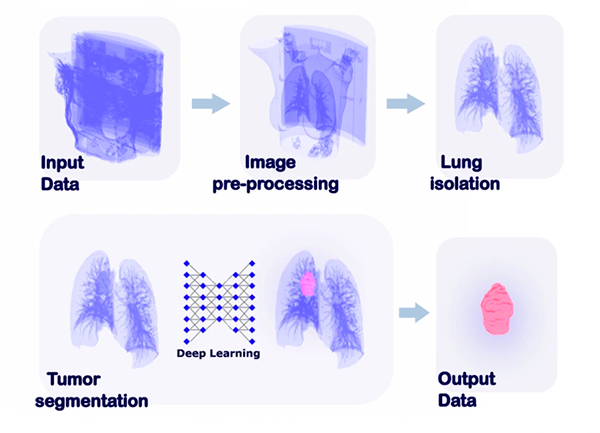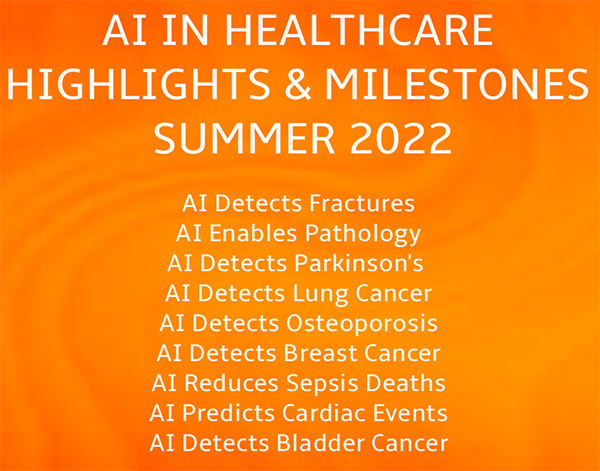Do headlines like this give us hope that artificial intelligence/machine learning (AI/ML) may be the great equalizer in healthcare’s battles with some gruesome diseases? Stories of hope like this:
“Artificial intelligence-enabled detection and assessment of Parkinson’s disease using nocturnal breathing signals (Nature Medicine)” and “New MIT study trains a neural network to analyze a person’s breathing patterns while sleeping and determine whether the subject has Parkinson’s (Neuroscience News).”
Flipping the Lens: On Fear & Loathing of AI/ML author Margaretta Colangelo, co-founder of Jthereum, is back with us again sharing insights on the applications of AI in medical diagnosis, drug discovery, precision health and personalized medicine. This time, it’s her new new AI in Healthcare Highlights & Milestones Report for Summer 2022 creating all the waves with some of the most astonishing work done by AI/ML to date.
This time around, she takes on:
Fractures
Sepsis deaths
Cardiac events
Breast cancer
Lung cancer
Osteoporosis
Diabetic retinopathy
Heart disease
Bladder cancer; and
Parkinson’s
This is my new AI in Healthcare Highlights & Milestones Report for Summer 2022.
This report includes an overview of advances made during the summer across the healthcare spectrum including important studies, regulatory clearances, fundraising, partnerships, and growth in the AI ecosystem worldwide.
This summer scientists demonstrated how they successfully used AI in many areas including: to reduce sepsis deaths, to predict cardiac events, to detect breast cancer, to detect lung cancer, to detects osteoporosis, to detect Parkinson’s, to monitor diabetic retinopathy, to detect heart disease, to detect bladder cancer, to enable pathology, to detect fractures, and to monitor Parkinson’s using the Apple Watch.
Radiologists More Accurate Detecting Breast Cancer with AI Than Without AI
In July scientists in Germany published a large-scale study demonstrating that radiologists working with AI were more accurate detecting breast cancer than radiologists working without AI, and vice versa – the AI was more accurate when working with a radiologist than when working independently.
The study was led by Vara, a German company, in collaboration with radiologists at the Essen University Hospital in Germany and the Memorial Sloan Kettering Cancer Center in New York. Vara’s AI is has been used by radiologists in German breast screening centers for two years and is used in 30% of Germany’s breast cancer screening centers. Vara’s AI software is also used to screen for breast cancer in a hospital in Mexico and in a hospital in Greece. This is the first study to compare AI’s performance in breast cancer screening alone vs. with assistance from a human radiologist. This type of human/AI collaboration is expected to improve accuracy of diagnosis, help detect breast cancer earlier, and improve survival rates.
The study was led by Vara, a German company, in collaboration with radiologists at the Essen University Hospital in Germany and the Memorial Sloan Kettering Cancer Center in New York. Vara’s AI is has been used by radiologists in German breast screening centers for two years and is used in 30% of Germany’s breast cancer screening centers. Vara’s AI software is also used to screen for breast cancer in a hospital in Mexico and in a hospital in Greece.
This is the first study to compare AI’s performance in breast cancer screening alone vs. with assistance from a human radiologist. This type of human/AI collaboration is expected to improve accuracy of diagnosis, help detect breast cancer earlier, and improve survival rates.
AI Detects and Segments Lung Cancer Tumors Quickly With High Accuracy
In June Philippe Lambin, PhD, Sergey Primakov, PhD, and colleagues at Maastricht University in the Netherlands published a paper detailing how they developed an AI method that can detect and segment lung cancer tumors more effectively than human radiologists. The method is fast and reproducible and it predicted survival rates better than manual segmentations.

The AI can help doctors diagnose lung cancer, determine the size of tumors, plan precise radiation treatment, and monitor effectiveness of treatment. The AI method performed so well that the scientists made their method and associated software open source and available to other scientists.
Dr. Lambin anticipates three applications of this software: diagnosis, radiotherapy delineation, and response evaluation.


